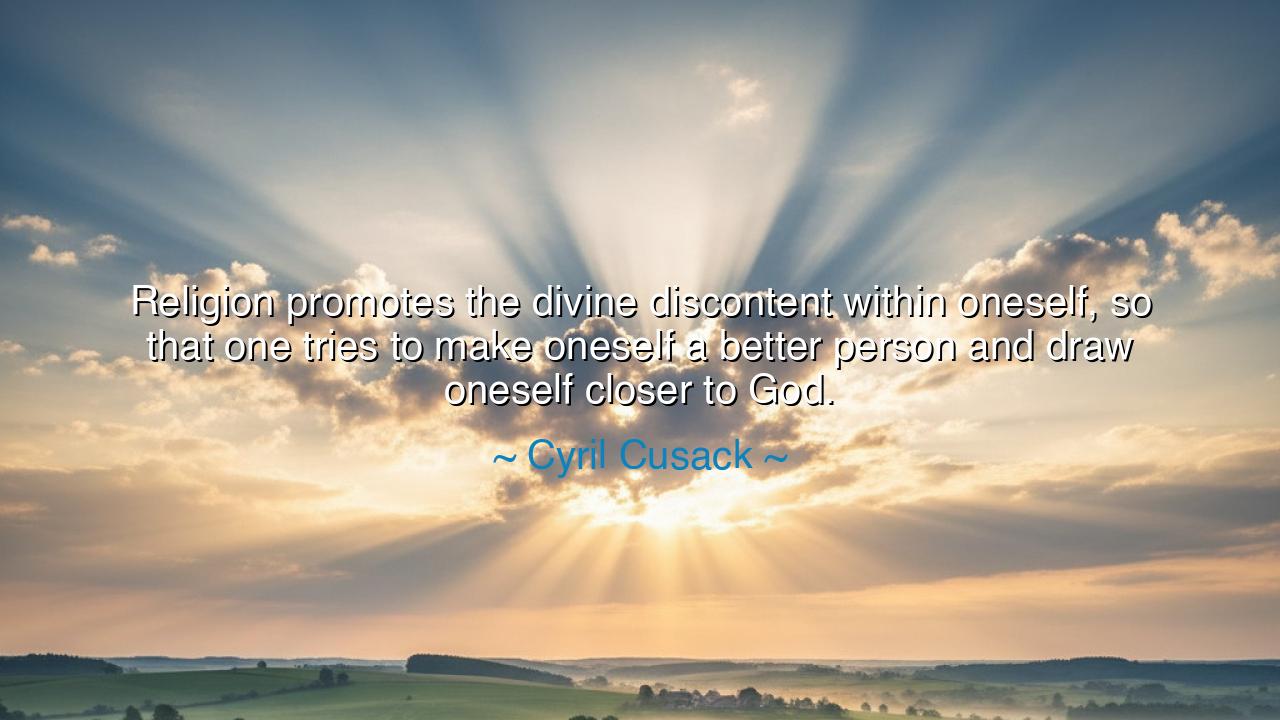
Religion promotes the divine discontent within oneself, so that
Religion promotes the divine discontent within oneself, so that one tries to make oneself a better person and draw oneself closer to God.






In his quiet depth of thought, Cyril Cusack once spoke these luminous words: “Religion promotes the divine discontent within oneself, so that one tries to make oneself a better person and draw oneself closer to God.” At first hearing, one might pause at the phrase “divine discontent”, for it joins two seeming opposites — holiness and unrest. Yet within this tension lies the beating heart of spiritual growth. Cusack reveals a sacred truth known to the sages of every age: that to feel the ache of imperfection is not a curse, but a gift — a whisper of the divine urging the soul to rise.
To live with divine discontent is to sense that one’s present self, however noble, is not yet complete. It is the fire that refuses to let the spirit grow complacent. It is the quiet stirring that awakens at dawn and says, “There is more to learn, more to love, more to give.” This restlessness is not born of vanity or guilt, but of longing — a holy longing to grow nearer to the infinite, to cleanse one’s heart and walk in harmony with the eternal. In this way, religion, at its truest, is not a chain of commandments, but a mirror that shows us what we may yet become.
The Buddha himself spoke of this divine restlessness. Before his enlightenment, he lived amid luxury and peace, yet an unease grew within him — a whisper that comfort was not truth. He left his palace, his family, his throne, and walked barefoot into the unknown, guided only by the hunger for wisdom. This was divine discontent — the refusal to settle for mere existence when the soul craved understanding. And in the silence beneath the Bodhi tree, his longing was fulfilled. His story teaches us that without this sacred unease, the heart sleeps forever in mediocrity.
The same spirit moved Saint Augustine, who cried out, “Our hearts are restless until they rest in Thee, O Lord.” Though centuries and continents separate Augustine and the Buddha, both drank from the same river of truth. The longing they felt was not worldly dissatisfaction, but the echo of their divine origin calling them home. This inner tension — between what we are and what we could be — is the thread that binds all seekers across time. Cusack’s words remind us that the discomfort we feel when we fall short of goodness is not punishment, but invitation.
Yet how easily we mistake this holy ache for despair! Many flee from their discontent, seeking distraction in pleasure or pride. But the wise know that divine discontent must not be silenced; it must be guided. It is the teacher within that whispers, “You can do better, love deeper, forgive more.” When we listen to that voice, it refines us as fire refines gold. Every struggle, every act of repentance, every moment of humility brings us closer to the Divine Presence. For the soul’s journey is not a sprint toward perfection, but a steady climbing toward light.
Consider the life of Mahatma Gandhi, who constantly examined his own heart. Though revered by millions, he never considered himself holy. He fasted not to boast, but to discipline his will; he confessed his weaknesses publicly, believing that truth must begin within oneself. His restlessness to become purer in thought and deed was his religion in motion — a living testament to Cusack’s truth that faith awakens the desire to become better, not to boast of righteousness.
So, my children, when you feel the sting of conscience, do not despair — that is your divine discontent speaking. It is the mark that your spirit is alive, that you are still reaching upward. Welcome it as a sacred friend. Let it move you to prayer, to reflection, to kindness. Do not fear your imperfections; fear only the day when you no longer wish to rise above them.
For the true path of religion is not about certainty, but about striving. To draw closer to God is to walk with humility, ever aware of the distance, yet grateful for each step. Remember this, and live with a heart both restless and reverent — for the soul that burns with divine discontent will never grow cold, and through its longing, it will find the peace it seeks.






AAdministratorAdministrator
Welcome, honored guests. Please leave a comment, we will respond soon